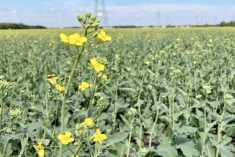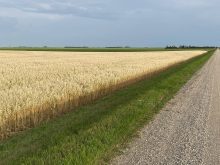The new Seed Variety Use Agreement (SVUA) pilot project, unveiled in Winnipeg Feb. 25, will demonstrate the benefits of farmers paying breeders a royalty for seed saved for planting.
But the Prairies’ five wheat and barley commissions have “significant concern” about the project, they said in a news release.
The SVUA pilot is being organized by the Canadian Plant Technology Agency (CPTA) and the Canadian Seed Trade Association (CSTA).
In addition the CPTA and CSTA have formed a working group with farmer and industry representation.
Read Also

Alberta crop conditions improve: report
Varied precipitation and warm temperatures were generally beneficial for crop development across Alberta during the week ended July 8, according to the latest provincial crop report released July 11.
“These combined efforts are an opportunity for industry to show leadership and establish how the SVUA will provide value for farmers, industry and the agriculture sector at large,” the CPTA and CSTA said.
To begin, the pilot will include three crop variety options — CS Daybreak, a Canada Western Red Spring wheat, CS Accelerate, a Canada Prairie Red Spring wheat, and ND17009GT, a Roundup Ready 1 soybean developed at North Dakota State University.
However, ND17009GT, which will be distributed by SeCan, must first be registered in Canada before it can be sold here.
Why it matters: Seed royalties have been a long-standing issue, with many farmers worried about increased costs without any accountability. The pilot will demonstrate how one system might work, but could undermine ongoing consultations.
The issue has been debated more more than a decade.
Farmers who grow hybrids, such as corn and canola, or crops with a technical use agreement forbidding farm-saved seed, must buy new seed every planting season. As a result they pay a royalty to the breeder annually.
But with open-pollinated crops, such as cereals, farmers only pay a royalty when they buy certified seed. It’s common, and legal, for farmers to save some of the harvest from that first crop for planting in future years, avoiding paying a royalty until they buy certified seed again.
The five Prairie wheat barley commissions — Manitoba Wheat and Barley Growers Association (MWBGA), Saskatchewan Wheat Development Commission, Saskatchewan Barley Development Commission, Alberta Wheat Commission (AWC), and Alberta Barley — say the pilot project undermines the consultations on the two options that Agriculture and Agri-Food Canada started in the fall of 2018.
“The five wheat and barley commissions are not a party to, nor supportive of this pilot SVUA program,” they said in a release. “The pilot is separate from the federal government’s consultation process on a new seed royalty structure and signals the seed industry’s commitment to the SVUA model despite the ongoing consultation.”
MWBGA chair Fred Greig says the pilot isn’t as much concern if the varieties on offer are private. Farmers can decide whether they want to grow them and pay a fee to plant saved seed.
“A big concern is, is there going to be a clear path, especially on farmer-funded varieties… so we can guarantee that we are not getting charged twice, and if we are at least it’s going back to the appropriate breeder and not someplace else,” Greig said in an interview Feb. 27.
There’s no risk of paying twice because what farmers contribute now falls short of covering the whole cost of publicly funded variety development, Todd Hyra, SeCan’s business manager for Western Canada, said in an interview Feb. 27.
“If they (farmers) like the product and believe the variety offers value to them then they would sign the agreement and away they would go,” Hyra said.
“It’s a new system. We need to walk before we run and lots of people say it sounds good but say, ‘show me the details, show me how it’s going to work.’ This is the opportunity to answer some of those questions, gain some experience and find out what’s working and what’s not.”
The commission says it wants farmers to know if they participate in the pilot it will prevent them from planting saved seed for free.
“It is critical that the government complete its consultations with grain producers and put a transparent and accountable process in place to demonstrate that the extra money producers are paying is advancing varietal development,” said Alberta Barley chair Dave Bishop.
“AWC believes that any trailing royalty system on varieties developed through the public breeding programs of AAFC (Agriculture and Agri-Food Canada) and the western universities must take into account the fact that farmers have already made a substantial investment in the development of those varieties,” said AWC chair Todd Hames.
The SVUA concept has been around awhile, but with advances in digital technology — apps and smartphones — it’s now easier to implement and administer, Hyra said.
The commissions are important partners in value creation, he added.
“So I look forward to working with the funding partner, which includes the various commissions across Western Canada… to make sure that we are advancing both the public and the private breeding programs across Canada,” Hyra said.
Syngenta’s decision to abandon its Canadian plant-breeding program last year is seen by some as a symptom of underfunding by farmers.
But a survey of farmers last year found a majority don’t support either royalty option.
“For each proposal, between 65 and 66 per cent of respondents disagreed, or strongly disagreed, that the models were worth further consideration,” the survey conducted by the three Prairie general farm organizations concluded. “The majority wanted to express an opinion about the two models, with less than 25 per cent selecting ‘more info needed’ or ‘neither agree nor disagree.’ Of those expressing an opinion, 79 per cent disagreed, or strongly disagreed, they should be pursued further.”




















